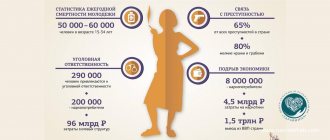- Reasons for initiating cases of economic crimes
- What is economic crime?
- From the experience of lawyers in economic cases
- Do you need a lawyer for economic crimes?
- Main articles of the Criminal Code on economic crimes
According to the legal statistics portal, in Russia there is a downward trend in the number of officially registered economic crimes. The detection rate of such crimes is also falling.
However, this does not indicate a real decrease in crime, but the emergence of new, “intelligent” methods of criminal attacks. In addition, the problem of initiating criminal cases under economic charges in order to put pressure on entrepreneurs still remains relevant.
Reasons for initiating cases of economic crimes
The category of economic criminal acts includes offenses that encroach on economic relations between various market participants, including entrepreneurs. And since the activity of any business is inevitably associated with making a profit with the financial risks accompanying this process, this explains its high crime rate.
In this regard, a Russian entrepreneur is always under particularly close attention from the authorities and is often subject to unfounded accusations.
The main reason for the increase in indicators is the crisis state of the state in the economic field, the impoverishment of citizens, and, as a consequence, greater activity of law enforcement agencies. The above reasons, among others, force the state to reduce all expenses, strengthen control and use the repressive apparatus in order to fill the budget. All this leads to the fact that law enforcement officers create the appearance of continuous activity, deliberately increasing the detection rates and pretending that there are no grounds for reducing funding. If fewer criminal cases were sent to the justice authorities than in the previous similar period, this is regarded by management from a negative point of view and entails consequences for officials.
Consequently, the brutal system of security forces and gaps in the law, coupled with the crisis state of the economy, lead to the fact that criminal cases are opened against businessmen on formal grounds for allegedly committing criminal acts in the sphere of economics and economic activity (tax evasion, fraud, etc. ) for annual improvement of statistical indicators.
Consequently, the brutal system of security forces and gaps in the law, coupled with the crisis state of the economy, lead to the fact that criminal cases are opened against businessmen on formal grounds for allegedly committing criminal acts in the sphere of economics and economic activity (tax evasion, fraud, etc. ) for annual improvement of statistical indicators.
First line of defense
Despite the fact that companies potentially have a high risk of facing economic crimes against them, it is necessary to fight them. Moreover, a line of defense can be built before the crime is committed. First, you should check the operating rules in force within the company. It is necessary to make control over the disposal of inventory items more stringent and at the same time transparent. Next, it is necessary to study the job descriptions of employees and exclude the possibility of one employee having exclusive rights to dispose of the company’s material and financial resources.
Albert Nagayev advises:
For example, invoices for payment or expense vouchers must be approved by two different officials.
It is worth paying attention to the selection of new employees, studying resumes more carefully, and selectively confirming the information contained in them.
After the audit of activities, it is necessary to create new internal regulations regulating various areas of the company’s economic life, including the reception and accounting of commodity and material assets, collection rules, quality of security of protected information, compliance with employee safety, work with contractors, verification of business partners, compliance .
Igor Bederov advises:
Most risks can be prevented precisely through well-structured regulatory mechanisms, as well as through the implementation of control over their compliance. This is important, because if there is no control, then there is no point in creating regulations “on paper”.
One of the typical and very common mistakes that lead to problems in combating crimes is the careless execution of written documents on transactions or their poor elaboration, for example, in the case when a company is preparing for a transaction with a business partner with whom it has been working successfully for a long time.
Tatyana Bakuleva comments:
Often businessmen do not draw up basic receipts for the transfer of money, and even if some papers are drawn up, their contents are not given due attention, which leads not only to the commission of fraud, but also to subsequent difficulties in proving the crime.
Subscribe to the magazine “Calculation” or “Calculation. Premium" for the 1st half of 2021!
What is economic crime?
Economic crimes are a type of offense that targets property and production legal relations, the economic rights of individuals, organizations, and public entities.
All economic criminal acts can be conditionally divided into three separate groups, where the criterion for differentiation is the generic object of the criminal attack.
The first group consists of crimes against property
- Art. 159 - fraud;
- Art. 160 - misappropriation or embezzlement;
- Art. 165 - causing property damage by deception or abuse of trust;
The second group consists of acts in the field of economic activity and provides for punishment under the following articles of the Criminal Code of the Russian Federation:
- Art. 169 - obstruction of legitimate business activity;
- Art. 171 - Illegal business;
- Art. 172 - Illegal banking activities;
- Art. 174 - Legalization (laundering) of funds or other property acquired by other persons illegally;
- Art. 174-1 - Legalization (laundering) of funds or other property acquired by a person as a result of committing a crime;
- Art. 179 - Coercion to complete a transaction or to refuse to complete it;
- Art. 180 – Illegal use of a trademark;
- Art. 196 - Intentional bankruptcy.
- Art. 198 - Evasion of taxes and (or) fees from an individual;
- Art. 199 - Evasion of taxes and (or) fees from an organization;
- Art. 199-1 - Failure to fulfill the duties of a tax agent;
- Art. 186 - production or sale of counterfeit money or securities;
- Art. 187 - production or sale of counterfeit credit or payment cards and other payment documents.
The third group consists of crimes against the interests of service in a commercial or other organization:
- Art. 201 – Abuse of authority;
- Art. 204 - Commercial bribery.
From the experience of lawyers in economic cases
Based on our experience in handling cases of economic crimes, we can state the following fact: every year there are more and more cases when criminal cases are initiated even on the third day after the presentation of a statement from the injured party, and cases are often initiated illegally, without any verification by the investigation. As a rule, the very next day after the decision to initiate a case is issued, the investigator applies to the justice authority to seize property assets.
In 83% of cases, the initiation of a criminal case leads to the fact that a businessman is completely or partially deprived of his business - this interesting point was noted by President Vladimir Putin at one of his annual addresses to the Federal Assembly.
The existing practice in our country of judicial review of cases under economic clauses states that if your case is brought to court, there will be no acquittal. This suggests a conclusion - potential victims and accused seek to resolve all issues at the investigation stage.
As a rule, when a criminal case of an economic nature is initiated, an entrepreneur is placed under arrest or house arrest. At the same time, pressure is being exerted on businesses through the seizure of papers from financial and economic activities, computer equipment, and the seizure of assets and money in accounts.
The sooner you turn to us for help, the greater your chances of turning the situation in your favor and solving the matter with little loss, or even avoiding any problems altogether.
Involve a lawyer in your case?
Our lawyers can significantly complicate or even prevent the investigation from illegal and unreasonable actions to collect materials on economic crimes, and sometimes even exclude various evidence and materials from the case, since it is possible to challenge or prove that these materials were obtained illegally and cannot be used in the judiciary.
Initial consultation on economic crimes
and
business protection
for free.
Do you need a lawyer for economic crimes?
Economic criminal acts are recognized as one of the most difficult, since they can involve various logistics schemes, financial processes, business projects and a huge amount of paperwork and accounting information.
A timely contact with JSC “Trial Advocate” will allow you to nullify some of the investigative actions for inspection or search in economic cases.
For a businessman, as a rule, it is almost impossible to sort out the specifics of financial and tax legislation; this, in turn, plays into the hands of security forces and investigative agencies, since it is easy to confuse the accused in a large and complex amount of information. The investigator also has the opportunity to use the defendant’s weak knowledge in the legal or financial sphere.
Often, even an accountant with extensive experience does not know all the legal subtleties that play a big role in preparing materials for initiating a criminal case, and since the investigator’s task is the maximum punishment, the investigator will try in every possible way to omit facts that could help mitigate the sentence or completely ruin everything case.
As a rule, when investigating acts in the economic sphere, the investigator will try to incriminate you under Article 159 of the Criminal Code of the Russian Federation.
According to Art. 159 of the Criminal Code of the Russian Federation “Fraud”, a citizen faces up to 10 years in prison and fines in the amount of 1,000,000 rubles.
Detailed analysis of economic crimes
At today's meeting, the Plenum of the RF Armed Forces considered the draft resolution “On judicial practice in cases of fraud, embezzlement and embezzlement,” which consists of 35 points regulating the application of criminal law in the field of economic crimes. After discussing the document, it was decided to send it for revision.
The need to adopt this draft resolution is due to the fact that the current resolution was adopted 10 years ago. As indicated in the document, it was prepared with the aim of ensuring uniform application by courts of the rules of criminal law on liability for fraud, misappropriation and embezzlement, as well as in connection with issues that have arisen in the courts.
Lawyer of the Moscow AP Valery Sarkisov, commenting on the draft document to AG, noted that since the adoption of the previous Resolution of the Plenum of the Armed Forces of the Russian Federation No. 51 of December 27, 2007 “On judicial practice in cases of fraud, misappropriation and embezzlement,” criminal legislation has changed , new forms and types of fraud arose, theft using electronic means of payment became widespread, questions arose related to the qualification of acts, as well as the distinction between fraud and related offenses, which required clarification from the highest judicial body.
The difference between fraud and other forms of theft The first paragraph of the document deals with fraud. The court pointed out its difference from other forms of theft, which lies in the method of committing the crime. As the lawyer explained, this provision repeats the existing one almost word for word, but what is new is the clarification that if deception is not a method, but only a means to facilitate the commission of theft, then the act should be classified as theft or robbery.
The document separately defines that the method of theft in fraud in the field of computer information is interference in the functioning of means of storing, processing or transmitting computer information or information and communication networks. This provision is new and, according to Valery Sarkisov, has important practical significance when deciding on the qualification of acts under Art. 159.6 of the Criminal Code of the Russian Federation. This article, introduced in 2012, has not received the necessary distribution necessary due to the development of theft in the computer sphere.
Silence as a method of theft The document explains that deception as a method of theft or acquisition of rights to someone else's property may consist of silence about true facts. Managing partner of Zabeida and Partners, Alexander Zabeida, believes that such an explanation is applicable to crimes committed in complicity, since silence is a type of inaction, and theft, which is the seizure of property, by its nature cannot be such.
Intention as a qualifying characteristic According to Valery Sarkisov, the Plenum of the RF Armed Forces in the document under consideration outlines the basic principle of distinguishing between failure to fulfill contractual obligations as a civil offense and fraud. “The determining fact is proposed to be the presence or absence of intent aimed at theft, which is not new for law enforcement practice,” he noted. However, the expert pointed out innovations that relate to determining the qualifications of fraud: it is necessary that the intent arose before receiving the property or rights to it. In addition, the Supreme Court lists facts that may indicate the presence of intent: a person’s deliberate lack of real opportunity to fulfill an obligation in accordance with the terms of the contract, the use by a person of forged documents when concluding a contract, including identification documents, statutory documents, letters of guarantee , certificates, concealment of information about the existence of debts and pledges of property, disposal of received property for personal purposes contrary to the terms of the contract, etc. It is noted that the listed facts in themselves do not indicate the guilt of a person; in each case, taking into account all the circumstances of the case, it is necessary to establish the presence of persons with deliberate intent to fail to fulfill their obligations.
The moment of the end of the fraud Regarding the issue of the moment of the end of the fraud, Mikhail Kiriyenko, a partner at Kovalev, Ryazantsev and Partners, noted that the first version of the wording presented in the project practically reproduces the previously existing one and looks like this: in these cases, the crime should be considered completed from the moment the stolen persons are enrolled funds to an account (to a bank account, electronic money operator, mobile radiotelephone operator, etc.) controlled directly or indirectly by the person who committed the act, or by the person in whose favor this act was committed. The expert pointed out that the evaluative formulation ““indirect” control of the account” raises concerns, since it leaves the possibility of limitless expansion of such cases by the law enforcement officer.
But the second formulation, notes Mikhail Kiriyenko, is a categorically unacceptable explanation. In particular, it is proposed to determine the moment of the end of fraud in relation to funds in non-cash form by the moment of “withdrawal of funds from the bank account of their owner (for funds accounted for without opening a bank account - from the moment the balance of electronic funds is reduced), as a result of which the owner non-cash funds caused damage." This approach, according to the expert, contradicts the concept of theft, since seizure itself does not make it possible to use and dispose of someone else’s property. “One gets the feeling that this is an option for emergency services. If this approach remains, it will be a change in the criminal law norm through the interpretation of the RF Armed Forces, which is both unreasonable and increases the punitive component of Art. 159 of the Criminal Code of the Russian Federation,” the expert explained.
Fraud in the field of money circulation Analyzing the document, Alexander Zabeida noted that, most likely, the electronic money specified in the draft resolution refers to cryptocurrencies. Since the legal nature of this type of property currently has no legal definition, cryptocurrency is difficult to classify as electronic money. According to the lawyer, from a criminal point of view it can be attributed rather to another type of property or the right to such property. As for non-cash payments, the moment the crime ends is determined by the place where the fraudster received the funds, when he has a real opportunity to dispose of them, i.e. from the moment of crediting to the bank account. With cryptocurrency, Alexander Zabeida points out, it’s more complicated: the crypto wallet has no territorial reference. “It represents part of the encrypted key. This key provides the ability to manage cryptocurrency, information about which is available in the distributed registry, and therefore any information about a transaction, for example, transferring cryptocurrency to another wallet, appears simultaneously on all computers that embed data about the transaction in the block chain, the expert explained. “There are many places where the crime was committed in this case.”
At the same time, Valery Sarkisov pointed out that the draft does not contain the position of the Plenum of the RF Armed Forces regarding how exactly actions in relation to non-cash funds should be qualified. Pointing out that they are thefts, the Court does not say anything about which article of the Criminal Code of the Russian Federation they should be classified under, despite the fact that practice has developed a relatively uniform approach to resolving this issue.
The lawyer explained that the formation of rules for determining the place where the theft of non-cash funds ends and, accordingly, the jurisdiction of such acts is extremely necessary. In this regard, the draft proposes to approve one of two options: at the location of the guilty person or at the location of the banking institution. In this case, if it is impossible to determine the place of termination, the place where the crime was detected (the place where the crime was reported) is considered. The expert noted that in practice both methods are used, but the second option is more common. The lawyer pointed out that in any case, the Court's clarification on this issue would be of great practical importance.
Fraud, as a result of which a citizen is deprived of the right to housing “The Plenum of the RF Armed Forces puts an end to practical disputes regarding the qualification of fraud, as a result of which a citizen is deprived of the right to housing,” says Valery Sarkisov. It is proposed not to take into account whether the housing to which the victim has lost the right is the only one, whether it is used for living or not. The Court also states that those acts that result in the citizen being deprived not of the right, but of the opportunity to acquire such a right, are not subject to classification as fraud in depriving a citizen of the right to use residential premises.
Questions of qualification The document lists the signs, the presence of which can qualify the act under Parts 5–7 of Art. 159 of the Criminal Code of the Russian Federation as fraud associated with intentional failure to fulfill contractual obligations in the business sphere. Separately, it is indicated that it is necessary to establish in each case the presence of direct intent that arose before the receipt of property or rights to it.
The draft resolution also specifies the basis by which the elements of fraud should be distinguished from the elements of crimes provided for in Art. 172.2 and 200.3 of the Criminal Code of the Russian Federation. To do this, it is necessary to find out whether the person actually carried out investment, entrepreneurial or other legal activities. If there is no such activity, the act should be classified as fraud without additional qualification under other articles.
The draft document for the first time pays attention to the issues of qualification of certain types of fraud according to those that emerged after the adoption of the previous Resolution of the RF Armed Forces No. 51 Art. 159.1, 159.2, 159.3, 159.5 and 159.6 of the Criminal Code of the Russian Federation. Valery Sarkisov noted that the issue of ensuring uniformity in the practice of applying these provisions has been long overdue, therefore certainty in their interpretation is especially significant.
Mikhail Kiriyenko noted that the draft resolution partially clarifies previously existing provisions. Thus, attention is drawn to the definition of “continuation” of fraud when establishing the value of the subject of the crime. The Armed Forces of the Russian Federation indicated: “In the event of several thefts of someone else’s property, the total value of which amounts to a large or especially large amount, the act is qualified taking into account the corresponding criterion, if these thefts were committed in the same way and under circumstances indicating an intent to commit theft on a large or especially large scale.” size." This approach, according to the expert, reflects the importance of subjective imputation and assessment of the direction of intent, which is often ignored.
Lawyer and partner of ZKS Law Firm Alexey Kasatkin explained that the draft resolution of the Plenum of the RF Armed Forces is relevant and meets the needs of existing law enforcement practice. The need for its adoption arose after the inclusion in 2012 of special rules on fraud in certain areas in the Criminal Code of the Russian Federation, as well as qualifying criteria enshrined in parts 5–7 of Art. 159. He also noted that the new clarifications were largely devoted to them.
Lawyers with extensive experience in economic cases
Our best specialists are ready to provide you with legal assistance 24 hours a day, seven days a week!
Our lawyers have over 20 years of legal experience
We are among the TOP 10 legal entities in Moscow
Hundreds of won cases and satisfied clients
- The staff consists of only professional lawyers. We are convinced that only experienced specialists can provide the highest quality legal services, therefore the minimum legal experience of our lawyers is 20 years; all of them have long experience as investigators in the past. The lawyers of JSC “Trial Advocate” have hundreds of won cases on economic crimes.
- Lawyers of JSC “Trial Advocate” provide their services to both suspects and accused, victims and witnesses. In addition, we are always ready to cooperate with legal entities.
- After signing an agreement with the client, lawyers will immediately begin providing legal services. Any information communicated to specialists is protected by law as attorney-client privilege, so you do not have to worry about their public disclosure.
Responsibility for economic crimes
Considering that the category of economic crimes includes a very large number of very different actions, accordingly, the punishment for them also varies. There is an approach by which you can determine the severity of punishment for committing an offense:
- the more damage is caused, the stricter the sanctions will be: if the amount of damage is several thousand rubles, most likely the culprit will get off with a small fine or suspended sentence, and in criminal cases for economic crimes, where the amount of damage amounts to millions of rubles, a penalty of up to 10-15 years of imprisonment. Fines also directly depend on the amount of damage;
- the influence of aggravating circumstances - if a crime was committed by a group of persons, by prior conspiracy, was associated with violence or the threat of force, blackmail was involved, etc., sanctions can be much stricter than in cases where there were no such circumstances;
- recidivism of criminal acts - if a person breaks the law for the first time, repents, cooperates with the investigation, most likely, they will meet him halfway and give him the minimum possible type of punishment, most likely a fine or a suspended sentence. If the crime is repeated (especially if it is the same or similar), the sanctions will be much more severe, and most likely will include actual prison sentences.
It should also be taken into account that those accused of economic crimes, along with the main punishment, are often awarded additional sanctions - fines, confiscation of property or a ban on holding certain positions (if the crime was related to the performance of official duties).







